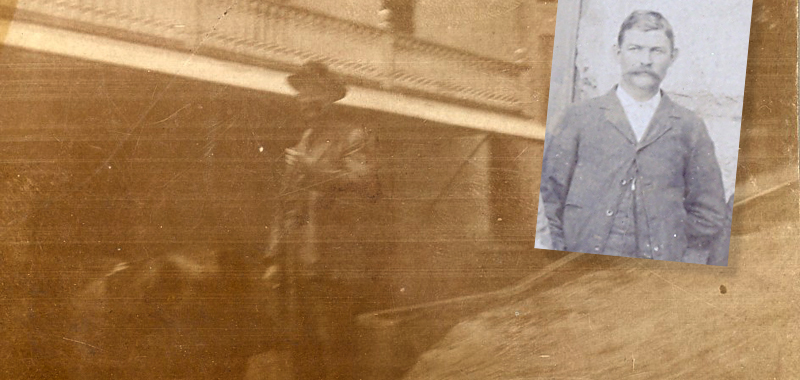
Deputy “Big Dip”
The Story of Deputy “Big Dip” Dependener, The Paul Bunyan of Placer Law Enforcement
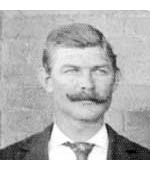 Editorial from the March 1, 1928 edition of the Auburn Journal:
Editorial from the March 1, 1928 edition of the Auburn Journal:
“In a serious automobile accident last week, one of the best officers Placer County ever had was killed and another seriously hurt. The accident cast a pall of gloom over the entire community from which it has not yet recovered.”
“For more than a third of a century, F.H. Dependener was identified with police activities in Placer County. During that time he was shot at and many times hit, cut at and many times carved, struck at and many times struck, but he always came back for more.
“His prowess and strength was the by-word of the crooks and yeggs throughout the length and breadth of the land. In the loss of “Big Dip” the county loses a valuable police officer.”
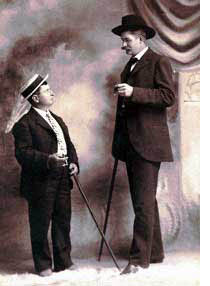
Big Dip and Shorty Nunes Frank Henry Dependener, 6' 7" Born Jan. 24, 1869. Died Feb 20, 1928. Deputy Sherrif of Placer County for over 31 years, and a partner in Yocum and Dip's, formerly the Union Saloon, now known as Carpe Vino.
So was mourned the passing of Frank “Big Dip” Dependener, a veritable Paul Bunyan of law enforcement in Placer County, a mountain of a man who was both respected and feared in Auburn and throughout the Foothills. Dead now for 75 years, Big Dip was not only a lawman, he was also a bar keeper, a partner in Yocum & Dip’s, formerly the Union Saloon and now home to Carpe Vino, a wine shop and wine bar in Old Town Auburn.
At six-feet, seven-inches, Big Dip was the tallest man in the county, and his imposing size and sheer strength were qualifications enough for being appointed a deputy sheriff in 1891 when he was just 21. He stayed on as a deputy for the next 37 years, through the administrations of four elected sheriffs.
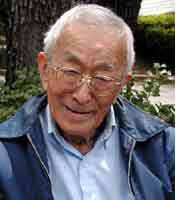 Frank Tsuda, 90, operator of Tsuda’s Grocery and Old Town Auburn’s oldest active merchant, has vivid memories of Big Dip. Frank was just 15 when Dependener was killed. “He used to live up around the corner on Brewery Lane, and I remember seeing him walk by often on his way to the courthouse,” recalled Frank. “He was a big man.”
Frank Tsuda, 90, operator of Tsuda’s Grocery and Old Town Auburn’s oldest active merchant, has vivid memories of Big Dip. Frank was just 15 when Dependener was killed. “He used to live up around the corner on Brewery Lane, and I remember seeing him walk by often on his way to the courthouse,” recalled Frank. “He was a big man.”
Tsuda’s sister, Dorothy, also was impressed by Big Dip’s frame. “He wore a huge hat, and whenever he came into our store, he had to bend over to get through the door.”
Though she never met her grandfather, Auburn resident Muff Azevedo heard plenty of stories about Big Dip. “He was a very gentle person,” she said, “But if you committed a crime, he’d grab you by the neck and carry you up to the courthouse.”
Born in 1869 in Rock Creek, he married Virginia Lee Barrett, who bore him two daughters, Beatrice and Mignon. Though there is no record of her malady, Virginia became seriously ill and underwent four operations in three years before finally succumbing on June 6, 1904.
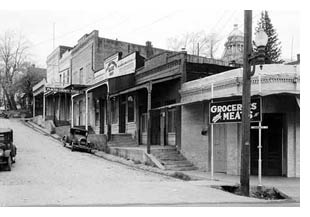 Her death came just as her husband was deeply embroiled in helping investigate a bold, daylight robbery of the Placer County Bank, whose original building survives on Commercial Street in Old Town Auburn. At about 3 p.m. on May 26, a man in an amateurish disguise entered the bank with a .22 caliber six-shooter and stole $5,000 in cash after vaulting over a four-foot-high counter when the clerk was slow to respond to his demands. Before leaving, he fired a shot at a bank official in an adjacent office and then stole a horse and rancher’s cart tied at the street to make his escape.
Her death came just as her husband was deeply embroiled in helping investigate a bold, daylight robbery of the Placer County Bank, whose original building survives on Commercial Street in Old Town Auburn. At about 3 p.m. on May 26, a man in an amateurish disguise entered the bank with a .22 caliber six-shooter and stole $5,000 in cash after vaulting over a four-foot-high counter when the clerk was slow to respond to his demands. Before leaving, he fired a shot at a bank official in an adjacent office and then stole a horse and rancher’s cart tied at the street to make his escape.
Even as his wife hovered near death, Big Dip was no doubt part of the posse that spent the evening searching the surrounding area for the bank robber whose weapon, clothing and cart were found a short distance from town. It would not be until early November 1904, however, that the bank robber would be caught after the commission of the most heinous crime ever committed in Auburn. And, again, Big Dip would be involved.
At 7:30 on the evening of November 10, hundreds of Auburn residents responded when fire raged through the stately home of Julius Weber, a wealthy businessman and former owner of the Auburn Brewery. By the time the flames were extinguished, the bodies of Weber, his wife and two of their three children were removed. Julius, his wife and daughter had been shot to death; his youngest son was beaten badly and died shortly after being rescued. Several of the bodies had been burned in an attempt to mask the crime.
Almost immediately, Weber’s 20-year-old son and only surviving family member, Adolph, was arrested for the murder of his mother, and he was quickly connected to the robbery of Placer County Bank, some five months earlier. Big Dip, now a widower, was assigned to help collect the evidence used to convict Adolph who, through a series of appeals, was able to delay his inevitable execution. When he was eventually taken to Folsom Prison for his date with the hangman in November 1906, Big Dip rode shotgun on the carriage used to transport the condemned man.
Though violence was not uncommon in turn-of-the-century Auburn, executions were. In fact, just a few months before Adolph Weber robbed Placer County Bank, a man named William Glover was hung on January 11 for murdering the father of his 14-year old girl friend. This was the first Auburn-connected hanging since Stephen Bowdon Richards was hung on January 12, 1884, in the jail yard at Auburn.
This is of note because the morning after Richards lost a large sum in a card game ten months earlier at the Auburn Hotel, he confronted one of the other players, a “Mr. F. Dependener,” according to a report in the Placer Herald. This was Big Dip’s father, and Frank was 15 at the time. Richards’ attempt to lure the elder Dependener into a brawl failed, so he turned on another guest who tried to intervene and shot him dead.
It seems Big Dip was never far from the action himself, and never afraid to wade into trouble. After his death, the Auburn Journal reported, “Dependener was said to have been wounded at least seven times by bullets, and to have borne about thirty marks inflicted by hostile criminals with weapons of various kinds.”
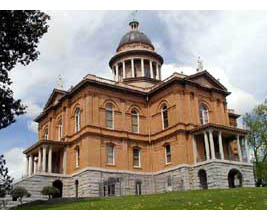 His most notable encounter was April 9, 1916, when he was seriously wounded in a spectacular gun fight with Albert and Jim Cox on the steps of the Placer County Courthouse in Auburn. Big Dip, who was an excellent marksman, arrested a third brother, Arthur, in the early afternoon after the group had torn up a Japanese grocery store during a drunken spree.
His most notable encounter was April 9, 1916, when he was seriously wounded in a spectacular gun fight with Albert and Jim Cox on the steps of the Placer County Courthouse in Auburn. Big Dip, who was an excellent marksman, arrested a third brother, Arthur, in the early afternoon after the group had torn up a Japanese grocery store during a drunken spree.
The Cox brothers drove to Newcastle to raise $10 in bail money, and then stopped in Ophir on the return to trip and picked up their pistols. They tracked down Big Dip at Kenison’s Cigar store and pleaded for their brother’s release. Big Dip agreed, but only if they left town immediately.
Big Dip walked up to the courthouse and met the Cox boys who had driven. According to a report in the Placer Herald, the men became rowdy again, and Big Dip “admonished them to keep quiet.”
As Big Dip turned to start up the steps, Albert drew his pistol and fired, barely missing his head. Jim Cox followed suit, and the pair fired a volley and dropped him to the ground with bullets in his right lung, leg and hand. The Herald described the heinous deed: “It was a most cowardly act, as Dip was shot from behind and without warning.”
Though gravely injured, Big Dip drew his own pistol and fired four shots, hitting Albert twice. A later newspaper report embellished the tale a bit: “His right arm disabled by a bullet, Dependener switched his gun to his left hand and battled with them until he crumpled, but not before wounding one of the brothers.”
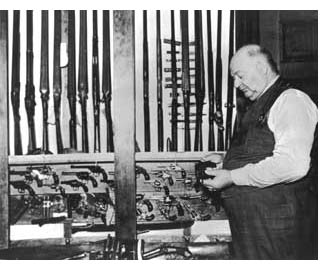 A posse was formed immediately and set out in an unsuccessful hunt for the assailants. None-the-less, Big Dip’s attackers were quickly in custody, one captured by Sheriff Elmer Gum in a train yard in Winnemucca, Nevada; the other surrendered and both were held on $5,000 bond, a tremendous sum in those days. At least Jim Cox was repentant for his crime, saying he hoped Big Dip got well and “If we had not been drinking we wouldn’t have done it.”
A posse was formed immediately and set out in an unsuccessful hunt for the assailants. None-the-less, Big Dip’s attackers were quickly in custody, one captured by Sheriff Elmer Gum in a train yard in Winnemucca, Nevada; the other surrendered and both were held on $5,000 bond, a tremendous sum in those days. At least Jim Cox was repentant for his crime, saying he hoped Big Dip got well and “If we had not been drinking we wouldn’t have done it.”
Local lore says that when Big Dip was hospitalized after being wounded, there was no bed long enough to contain his huge frame. The problem was solved when his personal bed from home was delivered to the hospital.Placer County Sheriff Elmer Gum
As soon as word got out, well-wishing telegrams poured in from law enforcement organizations all over the state. His already legendary status was heightened by the attack. Again from the Placer Herald: “While being recognized as a very brave officer, one who has never yet showed the ‘yellow streak’ during his long service, he is kind and has a big heart, and would not harm a flea unless it was his duty to do so.”
He recovered and returned to his job, though he carried two bullets for the rest of his life as a reminder of his encounter with the Cox boys. They had plenty of time to think about their crime since they were both sentenced to 20 years in San Quentin.
Big Dip had another close call that added to his celebrity, as reported by the local press: “In one encounter when he and Sheriff Conroy were after stage robbers and near the wire bridge, Dip stood out in the open and several shots were fired at him from ambush but he was not hit.”
After Big Dip’s wife died in 1904, it appears that he was not able to deal with the day-to-day demands of being the single parent of two children, though it was said that he lived for “his two little orphan daughters.” As a result, Beatrice and Mignon were sent to live with Mrs. E. Richenmacher, though their father provided for their support and education. Both girls were tall in maturity, with
Beatrice growing to be six feet, one inch. Frank Tsuda has memories of seeing the sisters walking in Old Town. “They were easy to spot on the street,” he recalled.
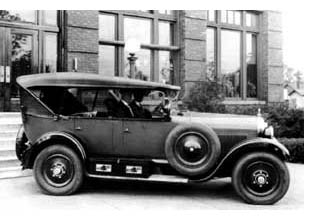 Big Dip’s luck as a lawman finally ran out on February 22, 1928, after he had assisted Sheriff Elmer H. Gum in arresting a bootlegger near Roseville in what was described as “Allen’s Precinct.” It was by all accounts a routine raid on an illegal liquor operation that netted two casks of wine and a 68-year-old watchman.
Big Dip’s luck as a lawman finally ran out on February 22, 1928, after he had assisted Sheriff Elmer H. Gum in arresting a bootlegger near Roseville in what was described as “Allen’s Precinct.” It was by all accounts a routine raid on an illegal liquor operation that netted two casks of wine and a 68-year-old watchman.
Two other law officers participated in the raid, so the car Sheriff Gum was driving back to Auburn was heavily laden with five people and the casks of wine strapped to the back. Gum drove a Studebaker, and it could have been an open coupe called a Big Six Sheriff that was popular with law enforcement officials of the day.
Some 500 feet from Wise Power House on the state road between Auburn and Newcastle, Gum collided with a Reo sedan driven by an orchard owner from Newcastle. The Studebaker glanced off the oncoming vehicle and rolled 25 feet down an embankment, landing upside-down when it finally came to rest.
Big Dip’s neck was broken on impact and he died instantly. Sheriff Gum broke several ribs and was hospitalized. The prisoner, Joe Poeta, suffered a broken leg and one ear was nearly severed. All of the others had minor injuries.
The news of Big Dip’s death stunned Auburn, and, according to a newspaper report, “Lodge meetings and other gatherings were dispersed, that they might get the correct news.” His funeral “. . .was one of the largest ever held in Placer County, and was a fitting tribute to one of the best known Officers in the State of California. Visitors from all over the state attended the services.”
The irony in Big Dip’s death was even though he was a deputy sheriff, he steadfastly refused to learn how to drive an automobile. His explanation of why was related in his Auburn Journal obituary, “You never can tell what’s going to happen on one of these automobile trips.”
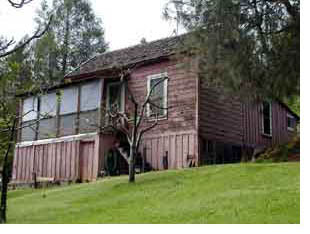
The home of "Big Dip" as it still stands today on Nevada Street near Old Town Auburn
In the end, Big Dip was a super-sized contradiction. Sacramento Police Captain Ed Brown described him as, “. . .one of the best known, best liked and most feared men in public service.” In fact, he was no doubt an uncomplicated man who enjoyed the simple pleasures of life, such as sitting out in front of his saloon on East Street, propped back in a chair, enjoying the warmth of the sun on his face.
He cut a dapper figure in his later years, often seen in his bowler hat, with a cheroot in one hand and a cane in the other. He lived in a small frame cottage that still stands on Nevada St., adjacent to the Crystal Dairy.The home of “Big Dip” as it still stands today on Nevada Street near Old Town Auburn
And though his exploits are legend, he probably spent most of his time with routine police work, handling domestic disputes, investigating petty theft, and rousting drunks from the honky-tonks of Old Town–including his own Yocum & Dip’s.
